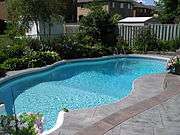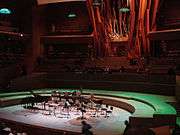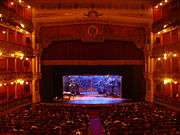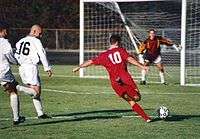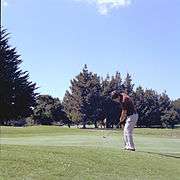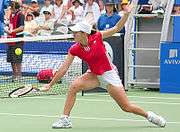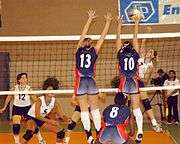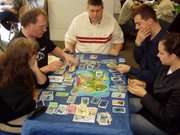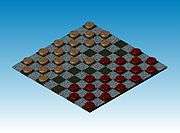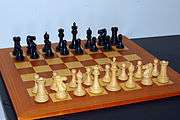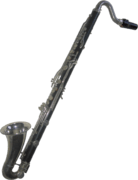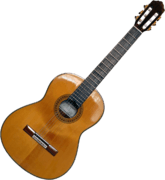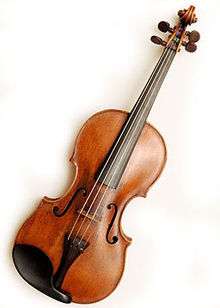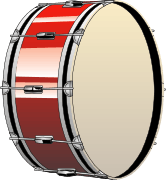By the end of this lesson, you should understand:
- Aimez-vous ce film ? Oui, je l'aime.
- Nous jouons aux cartes.
and possibly understand:
- Je lui donne le livre.
- Il adore jouer aux jeux vidéo.
Grammar · Regular -er verbs · Les verbes en -er
Most French verbs fall into the category of -er verbs. To conjugate, drop the -er to find the stem or root. Add endings to the root based on the subject and tense.
| |
|---|
jouerto play /ʒwe/
| Pronoun | Ending | Verb | Pronunciation |
| je | -e | joue |  /ʒu/ /ʒu/ |
| tu | -es | joues |  /ʒu/ /ʒu/ |
| il/elle | -e | joue |  /ʒu/ /ʒu/ |
| nous | -ons | jouons |  /ʒwɔ̃/ /ʒwɔ̃/ |
| vous | -ez | jouez |  /ʒu.e/ /ʒu.e/ |
| ils/elles | -ent | jouent |  /ʒu/ /ʒu/ |
Pronunciation, elision and liaison
The -e, -es, and -ent endings all have the same silent pronunciation. The -er and -ez endings are pronounced  /e/ , and the -ons ending is pronounced
/e/ , and the -ons ending is pronounced  /ɔ̃/ .
/ɔ̃/ .
In all conjugations, je changes to j ' when followed by a vowel or silent h:
- J'aime…I like…
- J'habite…I live…
In all plural forms, the s at the end of each subject pronoun, normally unpronounced, becomes a z sound and the n of on becomes pronounced when followed by a vowel.
Conjugation examples
| |
|---|
| Infinitive |
Stem |
Present indicative conjugation |
| | |
First person |
Second person |
Third person |
|
| aimer |
aim |
J' |
aime |
Tu |
aimes |
Il |
aime |
Singular |
| Nous |
aimons |
Vous |
aimez |
Ils |
aiment |
Plural |
| parler |
parl |
Je |
parle |
Tu |
parles |
Il |
parle |
Singular |
| Nous |
parlons |
Vous |
parlez |
Ils |
parlent |
Plural |
| habiter |
habit |
J' |
habite |
Tu |
habites |
Il |
habite |
Singular |
| Nous |
habitons |
Vous |
habitez |
Ils |
habitent |
Plural |
| écouter |
écout |
J' |
écoute |
Tu |
écoutes |
Il |
écoute |
Singular |
| Nous |
écoutons |
Vous |
écoutez |
Ils |
écoutent |
Plural |
Supplementary vocabulary · Common -er verbs
| |
|---|
| aimer |  /ɛ.me/ /ɛ.me/ | to like | | J’aime beaucoup ce tableau. | I love this painting. |
| arriver |  /a.ʁi.ve/ /a.ʁi.ve/ | to arrive, to happen | | | |
| chercher |  /ʃɛʁʃe/ /ʃɛʁʃe/ | to look for | | Je cherche du boulot. | I'm looking for some work. |
| demander |  /dǝ.mɑ̃.de/ /dǝ.mɑ̃.de/ | to ask (for) | | | |
| donner |  /dɔ.ne/ /dɔ.ne/ | to give | | | |
| écouter |  /ekute/ /ekute/ | to listen to | | J’écoute la radio. | I'm listening to the radio. |
| entrer |  /ɑ̃t.ʁe/ /ɑ̃t.ʁe/ | to enter | | Il entre dans la salle. | He's entering the room. |
| parler |  /paʁle/ /paʁle/ | to speak, to talk | | Zoé parle couramment le français. | Zoé speaks French fluently. |
| passer |  /pa.se/ /pa.se/ | to pass, to spend (time) | | | |
| porter |  /pɔʁ.te/ /pɔʁ.te/ | to carry, to wear | | Quentin porte un sac de blé. | Quentin is carrying a bag of wheat. |
| regarder |  /ʁǝ.ɡaʁ.de/ /ʁǝ.ɡaʁ.de/ | to watch | | | |
| sembler |  /sɑ̃.ble/ /sɑ̃.ble/ | to seem, to resemble | | | |
| trouver |  /tʁu.ve/ /tʁu.ve/ | to find, to surprise | | | |
Vocabulary · Places
| |
|---|
| la bibliothèque |  /bi.bli.jɔ.tɛk/ /bi.bli.jɔ.tɛk/ | library | caution: a librairie is a bookshop | On est à la bibliothèque publique. | We are at the public library. |
| le parc |  /paʁk/ /paʁk/ | park | | | |
| la piscine |  /pi.sin/ /pi.sin/ | swimming pool | | | |
| la plage |  /plaʒ/ /plaʒ/ | beach | | | |
| le restaurant |  /ʁɛs.to.ʁɑ̃/ /ʁɛs.to.ʁɑ̃/ | restaurant | | On dîne au restaurant français. | We are dining at the French restaurant. |
| la salle de concert | | concert hall | | | |
le cinéma
la salle de cinéma |  /si.ne.ma/ /si.ne.ma/ | cinema | | | |
le casino
la maison de jeu |  /ka.zi.no/ /ka.zi.no/ | casino | | Les jeux de casino sont des bons exemples de jeu de hasard. | Casino games are good examples of games of chance. |
| la salle de jeux |  /sal.də.ʒø/ /sal.də.ʒø/ | game room, playroom | | Le casino a six salles de jeu. | The casino has six game rooms. |
| le stade |  /stad/ /stad/ | stadium | | | |
| le théâtre |  /te.atʁ/ /te.atʁ/ | theater | | | |
Grammar · Direct object pronouns le, la, and les
The direct object pronoun le (
 /lə/), meaning it or him, replaces masculine singular direct objects:
/lə/), meaning it or him, replaces masculine singular direct objects:
- Je donne le livre au prof. (I'm giving the book to the teacher.)
- Je le donne au prof. (I'm giving it to the teacher.)
La (
 /la/), meaning it or her, replaces feminine singular direct objects:
/la/), meaning it or her, replaces feminine singular direct objects:
- Je donne la calculatrice au prof. (I'm giving the calculator to the teacher.)
- Je la donne au prof. (I'm giving it to the teacher.)
Les (
 /le/), meaning them, replaces plural direct objects:
/le/), meaning them, replaces plural direct objects:
- Je donne les livres au prof. (I'm giving the books to the teacher.)
- Je les donne au prof. (I'm giving them to the teacher.)
Le and la become l' before a vowel:
- Aimez-vous le concert ? Oui, je l'aime. (Do you like the concert? Yes, I like it.)
Le, la, and les can replace either people or things:
- Aimez-vous le film ? Oui, je l'aime. (Do you like the film? Yes, I like it.)
- Aimez-vous l'acteur ? Oui, je l'aime. (Do you like the actor? Yes, I like him.)
Summary
| |
|---|
| masculine singular direct object |
le |
  /lə/ (luh) /lə/ (luh) |
it, him |
| feminine singular direct object |
la |
  /la/ (lah) /la/ (lah) |
it, her |
| singular direct object, before a vowel |
l' |
/l/ |
it, him, her |
| plural direct object |
les |
  /le/ (lay) /le/ (lay) |
them |
Vocabulary · Sports, games, and instruments
The verb jouer /ʒwe/ is a regular -er verb meaning to play. It can be used to refer to sports, games, and instruments.
When referring to sports or games, jouer à … is used; recall that au /o/ replaces à le, and aux /o/ replaces à les:
- Je joue au baseball.I'm playing baseball.
- Nous jouons aux cartes.We are playing cards.
When referring to instruments, jouer de … is used; recall that du /dy/ replaces de le, and des /dɛ/ replaces de les:
- Je joue du piano.I'm playing the piano.
Supplementary vocabulary · Sports
| |
|---|
| le baseball |  /bɛz.bol/ /bɛz.bol/ | baseball | | | |
| le basket |  /bas.kɛt/ /bas.kɛt/ | basketball | | | |
| le football |  /fut.bol/ /fut.bol/ | football/soccer | | Il est un bon joueur de football. | He is a good football player. |
| le football américain |  /fut.bol a.me.ʁi.kɛ̃/ /fut.bol a.me.ʁi.kɛ̃/ | American football | | | |
| le golf |  /gɔlf/ /gɔlf/ | golf | | | |
| le tennis |  /te.nis/ /te.nis/ | tennis | | | |
| le volley |  /vɔː.le/ /vɔː.le/ | volleyball | | | |
Supplementary vocabulary · Games · Les jeux
| |
|---|
| le jeu (les jeux) |  /ʒø/ /ʒø/ | game | | Nous avons plein de jeux pour les enfants. | We have many games for the children. |
| le jeu de hasard | | game of chance | | Poker est un jeu de hasard.
Il joue aux jeux de hasard. | Poker is a game of chance.
He plays games of chance. |
| le jeu vidéo |  /ʒø vi.deo/ /ʒø vi.deo/ | video game | | Ce jeu vidéo est très difficile. | This video game is very difficult. |
| le jeu de société |  /ʒø də sɔ.sje.te/ /ʒø də sɔ.sje.te/ | board game | | | |
| le jeu de rôle | | role-playing game | | | |
| les cartes |  /kaʁt/ /kaʁt/ | cards | | | |
| les dames |  [daːm] [daːm] | checkers/draughts | | | |
| les échecs |  /e.ʃɛk/ /e.ʃɛk/ | chess | | Le jeu d’échecs a des règles complexes. | The game of chess has complex rules. |
| les dés |  /de/ /de/ | dice | | | |
Supplementary vocabulary · Instruments
| |
|---|
| la clarinette |  /kla.ʁi.nɛt/ /kla.ʁi.nɛt/ | clarinet | | Le son de cette clarinette est agréable. | The sound of this clarinet is nice. |
| le piano |  /pja.nɔ/ /pja.nɔ/ | piano | | Elle joue du piano depuis l’âge de trois ans. | She plays the piano since the age of three. |
| la guitare |  /ɡi.taʁ/ /ɡi.taʁ/ | guitar | | | |
| le violon |  /vjɔ.lɔ̃/ /vjɔ.lɔ̃/ | violin | | On danse au son du violon. | We are dancing to the sound of the violin. |
| la batterie |  /batʀi/ /batʀi/ | drums | singular in French | | |
Supplementary grammar · Indirect object pronouns lui and leur
Supplementary grammar · Conjugated verb + infinitive
Supplementary grammar · To have fun · S'amuser
The verb s'amuser means to have fun in English. It is a type of pronominal verb (a verb that includes a pronoun as part of it) called a reflexive verb, which means that the action of the verb is reflected back onto the subject. Literally translated, the verb means To amuse oneself.
| |
|---|
| Infinitive |
Stem |
Present indicative conjugation |
| | |
First person |
Second person |
Third person |
|
| s'amuser |
amus |
Je m' |
amuse |
Tu t' |
amuses |
Il s' |
amuse |
Singular |
| Nous nous |
amusons |
Vous vous |
amusez |
Ils s' |
amusent |
Plural |
Exercises
ExerciseFill in the blank using jouer
(Highlight or hover over a line to show the answer.)
Fill in each blank with the correct form of jouer.
| nous ______ |
nous jouons
|
| elle ______ |
elle joue
|
| tu ______ |
tu joues
|
| il ______ |
il joue
|
| elles ______ |
elles jouent
|
| vous ______ |
vous jouez
|
| je ______ |
je joue
|
| ils ______ |
ils jouent
|
| nous ______ |
nous jouons
|
| tu ______ |
tu joues
|
| on ______ |
on joue
|
| ils ______ |
ils jouent
|
| nous ______ |
nous jouons
|
| je ______ |
je joue
|
| vous ______ |
vous jouez
|
| on ______ |
on joue
|
| elles ______ |
elles jouent
|
| vous ______ |
vous jouez
|
ExerciseTranslation
(Highlight or hover over a line to show the answer.)
Translate from French to English.
| le théâtre |
theater
|
| le parc |
park
|
| la piscine |
swimming pool
|
| la salle de jeux |
game room, playroom
|
| le restaurant |
restaurant
|
| le stade |
stadium
|
le cinéma
la salle de cinéma |
cinema
|
| la plage |
beach
|
le casino
la maison de jeu |
casino
|
| la salle de concert |
concert hall
|
| la bibliothèque |
library
|
ExerciseTranslation
(Highlight or hover over a line to show the answer.)
Translate from English to French.
| restaurant |
le restaurant
|
| game room, playroom |
la salle de jeux
|
| theater |
le théâtre
|
| concert hall |
la salle de concert
|
| swimming pool |
la piscine
|
| cinema |
le cinéma
la salle de cinéma
|
| casino |
le casino
la maison de jeu
|
| library |
la bibliothèque
|
| stadium |
le stade
|
| beach |
la plage
|
| park |
le parc
|
Supplementary exercises
ExerciseTranslation
(Highlight or hover over a line to show the answer.)
Translate from French to English.
| porter |
to carry, to wear
|
| donner |
to give
|
| regarder |
to watch
|
| écouter |
to listen to
|
| parler |
to speak, to talk
|
| entrer |
to enter
|
| aimer |
to like
|
| demander |
to ask (for)
|
| sembler |
to seem, to resemble
|
| trouver |
to find, to surprise
|
| passer |
to pass, to spend (time)
|
| chercher |
to look for
|
| arriver |
to arrive, to happen
|
ExerciseTranslation
(Highlight or hover over a line to show the answer.)
Translate from English to French.
| to find, to surprise |
trouver
|
| to look for |
chercher
|
| to give |
donner
|
| to watch |
regarder
|
| to carry, to wear |
porter
|
| to speak, to talk |
parler
|
| to enter |
entrer
|
| to arrive, to happen |
arriver
|
| to listen to |
écouter
|
| to seem, to resemble |
sembler
|
| to like |
aimer
|
| to ask (for) |
demander
|
| to pass, to spend (time) |
passer
|
ExerciseFill in the blank using -er verbs
(Highlight or hover over a line to show the answer.)
Fill in each blank with the correct form of the -er verb in parentheses.
| nous ______ (parler) |
nous parlons
|
| elle ______ (chercher) |
elle cherche
|
| tu ______ (écouter) |
tu écoutes
|
| il ______ (entrer) |
il entre
|
| elles ______ (regarder) |
elles regardent
|
| vous ______ (aimer) |
vous aimez
|
| je ______ (demander) |
je demande
|
| ils ______ (sembler) |
ils semblent
|
| nous ______ (donner) |
nous donnons
|
| tu ______ (arriver) |
tu arrives
|
| on ______ (porter) |
on porte
|
| ils ______ (chercher) |
ils cherchent
|
| nous ______ (demander) |
nous demandons
|
| je ______ (regarder) |
je regarde
|
| vous ______ (sembler) |
vous semblez
|
| on ______ (aimer) |
on aime
|
| elles ______ (donner) |
elles donnent
|
| vous ______ (chercher) |
vous cherchez
|
![]() /e/ , and the -ons ending is pronounced
/e/ , and the -ons ending is pronounced ![]() /ɔ̃/ .
/ɔ̃/ .![]() /lə/), meaning it or him, replaces masculine singular direct objects:
/lə/), meaning it or him, replaces masculine singular direct objects:![]() /la/), meaning it or her, replaces feminine singular direct objects:
/la/), meaning it or her, replaces feminine singular direct objects:![]() /le/), meaning them, replaces plural direct objects:
/le/), meaning them, replaces plural direct objects:
